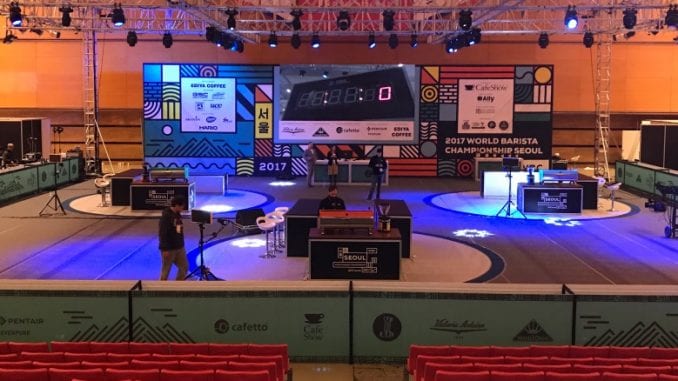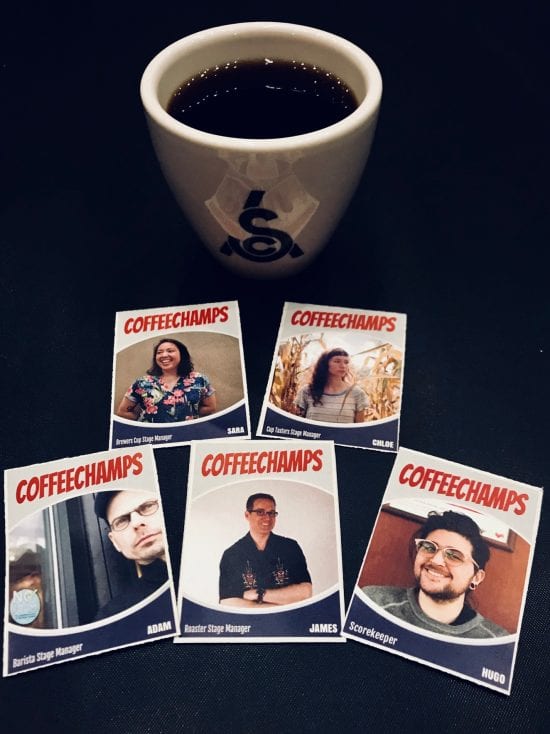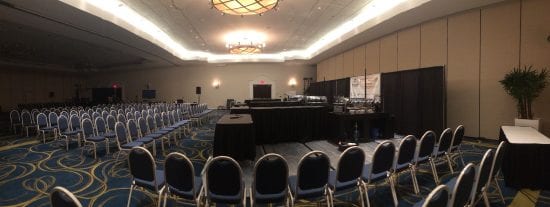
We go behind the scenes and profile the unsung heroes of coffee competitions—the folks who run around, make sure things are on schedule, set up practice space, and perhaps sometimes provide a shoulder to cry on in a moment of crisis: the stage managers.
BY KELLY HILL
SPECIAL TO BARISTA MAGAZINE
Cover photo courtesy of Carllee Curran
Anyone reading Barista Magazine is surely familiar with the United States Coffee Championships and the accompanying competitions (Barista, Brewers Cup, Cup Tasters, and Roasting), and maybe you even follow some champs on social media. Similar to the theater world, there are magical know-everything people (notice, I say know-everything, and not know-it-all, because they really do know everything) who are behind the scenes making sure everything goes according to plan. These people are known as stage managers, and they are the real heroes of competitions. These heroes definitely don’t wear capes, but they can always be found armed with Sharpies and masking tape. So, who are these masking tape crusaders? I spoke with a handful of past and present stage managers to get the scoop.

I became enamored with the volunteer work that goes into competition after competing in two preliminaries and the qualifier in 2017. I have volunteered at the Specialty Coffee Association Expo and Barista Camp, but this was a whole new level of intensity. I saw my stage manager (Sara Frinak, who was just profiled on this website) as a major support for the duration of the weekend. I honestly don’t think I would have done as well without that support. I am incredibly grateful to all of the people who dedicate so much time to competition and aren’t even competing, and I was shocked to realize that these people are there purely for the “love of the game,” as Sara put it.
Carllee Curran, the national competitions manager for the SCA and former stage manager, sheds some light on the position and what it takes to be a stage manager at competition. “Stage managers typically start off as volunteers, doing other on-stage jobs like timekeeping, bussing, or station maintenance,” she says.“After volunteering A LOT and then expressing interest to do more, they can end up being ‘recruited’ by a current stage manager, competitions staff member, or judges to get more involved.” Judging or competitor experience is not required, just dedication as a competition volunteer. There are currently five stage managers in the 2018 U.S. competition season. Carllee stresses that “without them, these competitions couldn’t happen.”
Keep in mind that for the most part, this is a labor of love. Stage managers are not paid, are the first to arrive, and are the last to leave an event. This is a huge commitment with no fame or glory awaiting them at the other side. Brewers Cup stage manager Sara Frinak describes her job as “herding cats. …We do what we need to do to run a smooth and fair competition. Everyone gets a fair shot at that 10 minutes. Everyone.” Cup Tasters stage manager Ben Helfen also expresses the importance of fairness, saying “ … my highest priority is to make sure that every single competitor from a round, whether they go first or last, is getting the exact same flight experience.”
Since these stage managers have so much experience in an intense competition arena, I had to ask for some anecdotes or horror stories. Sara recalls, “I’ve been yelled at, cursed at, cried on, hugged, burned, bruised—seriously, you deal with it all.” Others mentioned equipment failures, power outages, and even competitors running off. Ben’s most memorable competition mishap was at Cup Tasters in 2015. They were short on volunteers so someone new to the Cup Tasters format stepped up to help out, resulting in the winning cups being taken off the table, thus mixing up the correct and incorrect cups. The head judge had to go back through the video replay to sort out how well that particular competitor actually did. Ben said it all worked out, but it certainly made for an awkward situation.

I asked if anyone would like to comment on the SCA’s Deferred Candidacy Policy (DCP) that was announced last year and is still making waves in the coffee community. Amanda Hass, barista competition stage manager, commented, “The entire situation is complicated, and I am not happy about it. What I can say is that I hope it will bring the coffee community together.” Kami McCallie, an assistant stage manager for barista competitions, said the policy “felt like a punch in the gut,” but that she “was proud of the uproar that came out of the coffee community.” The consensus seems to be that the stage managers I spoke to are optimistic that the DCP has sprung the community into action and is forcing the hand of the SCA to become more transparent, as we preach so much in the coffee community.
These dedicated volunteers see themselves in coffee for the long run, and some of them have been in the game for over a decade. I asked Holly Bastin, a former barista competition manager, why competition is important for the coffee community. She replied, “Community, refinement, and innovation. It’s a place where we get together to hear each other’s ideas and taste the outcome of many experiments. It’s the future—the edge of the blade of future coffee.” Sara adds, “Competitions are only as important as we make them. … They’ve become a visible platform for people to present topics they feel are important. If you can speak the language of the rules and the scoresheets, if you can play the game, then you can move on to more visible platforms.”
I have immense respect for those who choose to take on these roles and what they bring to the spirit of competition. They really believe in the competitors and want them to succeed. I agree with Carllee that without stage managers, competition just couldn’t happen. We need these heroes backstage to cheer on competitors, get timekeepers on deck, and have a fresh Sharpie at the ready. If you’re looking to get involved in competitions and think volunteering might be for you, you can find more information here. Carllee will be looking forward to hearing from you!
 ABOUT THE AUTHOR
ABOUT THE AUTHOR
Kelly Hill is the director of education for Temple Coffee Roasters in Sacramento, Calif. She has enjoyed watching the specialty-coffee community in Sacramento grow over the last six years. Kelly has helped organize many coffee events in the area and has big plans for the future of the community. In her spare time, she enjoys eating ice cream, playing Tetris, and hanging out with her two cats.

